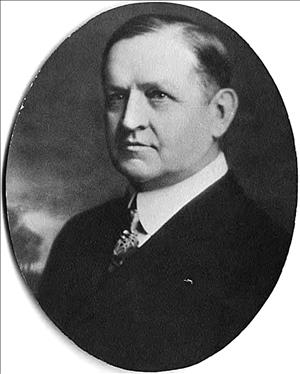On February 1, 1908, the Seattle Car Manufacturing Co. opens a modern railcar manufacturing plant in Renton. The destruction of Seattle Car's Youngstown plant by fire, coupled with the repercussions of the national financial panic of 1907, has placed the company in voluntary receivership. The new plant gives the business new momentum and company president William Pigott (1860-1929) and vice president Oliver D. Colvin will successfully shepherd the company through this difficult period. This company will evolve into Pacific Car and Foundry (1917), and eventually PACCAR (1972).
Designing Transportation for Logs
Seattle Car manufactured railcars, many specifically designed to meet the unique needs of Northwest loggers. From its inception in 1905, Pacific Car had placed a high value on creative, innovative thinking when it came to solving customers' design problems. The first innovation to come out of the Renton plant was the so-called "connected truck," a vehicle for the logging industry designed to carry the massive logs then coming out of Northwest forests. "Seattle Car's innovation was to tie the trucks together with strong lengthwise members, and install bunks to keep the logs in place and chocks to hold the ends securely" (Groner, 34). The cars were assigned the trade name "Hercules."
The company's next railcar innovation was an all-steel, 50-ton logging truck. The firm also introduced safer logging cars with air brakes and cars specifically designed to carry steam donkeys -- the portable, steam-powered winches that helped mechanize logging in the 1880s.
Invention and Innovation
In 1911, the company changed its name to Seattle Car and Foundry Company. The Federated Employees' Union represented the employees and secured for them (among other benefits) an eight-hour day.
The company was perfectly positioned to serve and benefit from the burgeoning logging industry in the Pacific Northwest. Every year between 1910 and 1917, the firm built some 656 railway cars and 107 industrial cars. Most of these went to handle logs. By 1920, the firm had built more than 7,000 logging cars of special design, worth about $10 million.
Seattle Car and Foundry also invented what came to be known industry-wide as the "Universal Trailer," a rubber-tired, two-wheeled trailer that was pulled by a motor truck rather than a locomotive. The Universal Trailer could haul massive timber from remote locations.
On September 4, 1917, Seattle Car and Foundry merged with its only West Coast competitor, Twohy Brothers of Portland, Oregon. The new company was named Pacific Car and Foundry.
PACCAR: Business of the Century
Pacific Car and Foundry became PACCAR in 1971. The company has been an important part of the Renton community since the first shift of workers entered the original factory in 1908. Many Renton families have had two, three, or even four generations employed by Pacific Car/PACCAR. The factory and its employees contributed greatly to the efforts of both World Wars.
On June 28, 2001, the Renton Chamber of Commerce honored PACCAR as its Business of the Century. The company is the oldest still extant business in Renton. PACCAR's 100-acre campus houses a Kenworth Truck plant, a distribution center, and the company's parts division.

